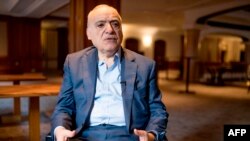The U.N.'s special representative for Libya said he hopes cease-fire talks that officially began Tuesday between the country's warring sides will reach a deal that can convince foreign powers to stop pouring in weapons and breaking an international arms embargo.
Ghassan Salame, the head of the United Nations support mission in Libya, lamented how the embargo has been "incessantly" violated since the fall of longtime autocrat Moammar Gadhafi in 2011, and said an international conference in Berlin last month sought to renew respect for it.
The weak U.N.-recognized administration holds the capital Tripoli and parts of the country's west. Led by Prime Minister Fayez Sarraj, it's backed by Turkey and to a lesser degree Qatar and Italy.
On the other side of the civil war is Gen. Khalifa Hifter, based in the country's east. His forces have been fighting to capture the capital for months, and are backed by the United Arab Emirates and Egypt as well as France and Russia.
Sarraj and Hifter have each named five members of a military committee to represent them at the Geneva talks toward a more permanent cease-fire.
Salame, speaking in Arabic through a translator, noted a "genuine will for both parties to sit together and start negotiations" in the talks, which quietly got underway Monday.
"If we come to a lasting cease-fire ... at least the parties in Libya will not need more weapons or more fighters," he said. "If these talks succeed, at least the pull factor will disappear. Because with the violation of the arms embargo, there is a push factor and a pull factor."
"If you agree on a lasting cease-fire, the pull factor will certainly weaken,'' Salame said, pointing to "more than 20 million pieces of weapons in the country and that is enough. The country doesn't need more."
Salame also noted that a blockade by Hifter's forces has slowed Libya's oil output to a trickle.
"I call on countries to support the U.N. attempts to resume production," he said. "Production has been hit severely. In fact, now Libya is only producing offshore, which is 72,000 barrels a day compared to 1.3 million barrels a day before the closure.''
Libya has the ninth largest known oil reserves in the world and the biggest oil reserves in Africa.




